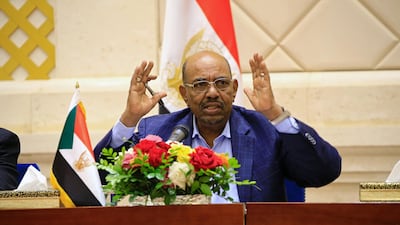A state of emergency was declared in the Sudanese city of Atbara after hundreds of people protested against price increases and set fire to the local headquarters of President Omar Al Bashir's party, officials said.
Residents took to the streets in the historically anti-government city on Wednesday to demand change amidst deepening financial woes and price hikes.
Authorities responded by announcing they had imposed a curfew in Atbra from 6pm to 6am.
A spokesman for the NCP commended the security forces for their approach to what he said were violent protests.
According to an eyewitness cited by the Sudan Tribune, this was the first instance of such organised protests in Atbara in years, adding that the number of people joining the march was on the rise and the slogans of a peaceful nature, including "peaceful, peaceful against the thieves".
“The situation is very severe and the number of protestors is on the rise … All residents of Atbara are now on the streets” he said.
The protest began with the arrival of students in the city centre who were joined by residents," said resident Mubarak Abdelrahim.
_______________
Read more:
Arab and African states discuss forming a Red Sea security council
Exclusive: Sudan looks to become an oil exporter by 2023
________________
The police "tried to disperse them with truncheons but they continued to demonstrate by setting fire to tyres," he added.
Demonstrations were staged in Port Sudan, Atbra and Nhoud and were sparked by the government's decision to raise the price of bread from one Sudanese pound to three (from about two to six US cents).
In Port Sudan, around 500 people, most of them students, marched in the streets chanting against the high cost of living, said Hussein Idriss, a resident in the Red Sea port city.
Shops had closed after the authorities decided to hike the price of bread, he added.
Similar demonstrations were held in Nhoud, with students marching and shouting "No to hunger", witnesses in the city said.
The bread shortage has hit Sudan's cities for the past three weeks, including the capital Khartoum.
In the past year, the cost of some commodities has more than doubled in Sudan, where inflation is running at close to 70 per cent and the pound has plunged in value.
Sporadic protests broke out in January this year over the rising cost of food, but they were soon brought under control with the arrest of opposition leaders and activists.
Sudan had significant oil reserves until South Sudan gained independence in 2011, and the north-south split saw the country lose three quarters of its reserves.

